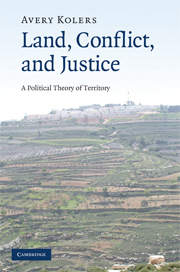Book contents
- Frontmatter
- Contents
- List of tables
- List of figures
- Foreword and acknowledgments
- Introduction
- 1 Everything you always wanted to know about taking other people's land (but were afraid to ask)
- 2 Land and territory in political theory
- 3 Groundwork
- 4 Plenitude
- 5 Territorial disputes
- 6 Implementation
- Works cited
- Index
4 - Plenitude
Published online by Cambridge University Press: 07 August 2009
- Frontmatter
- Contents
- List of tables
- List of figures
- Foreword and acknowledgments
- Introduction
- 1 Everything you always wanted to know about taking other people's land (but were afraid to ask)
- 2 Land and territory in political theory
- 3 Groundwork
- 4 Plenitude
- 5 Territorial disputes
- 6 Implementation
- Works cited
- Index
Summary
At the beginning of this book I introduced four schools of political thought on territory. The conflict approach, epitomized by Jacob Levy (2000), eschews general theories of territorial rights — essentially taking groups at their word regarding their interest in particular lands — in favor of a general strategy for resolving territorial conflicts between groups who conceive of land in incompatible ways. The dissolution approach, associated with institutional cosmopolitans (Chapter Two above), treats attachment to territory as, at most, a problem to be managed — an atavistic strain found among those who have failed to embrace global citizenship — not an autonomous element of social life worthy of moral consideration in its own right. On this view, the only aspect of territory that justice must consider is its value for markets or conventional political goods such as democratic institutions; special attachments to particular places are to be regulated by justice, not vice versa. Territory is therefore up for bid in aDworkinian resource auction, or subject to ignorance in an international Original Position (Beitz 1999; Pogge 1994). Aspects of this view are shared by individualists, who accept or defend the territorial state as a significant phenomenon worthy of preservation, but either cannot ground special connections to particular lands (Buchanan 2004), or, if they can, then treat them as derivative upon the property rights of individuals (Simmons 2001).
- Type
- Chapter
- Information
- Land, Conflict, and JusticeA Political Theory of Territory, pp. 100 - 138Publisher: Cambridge University PressPrint publication year: 2009



